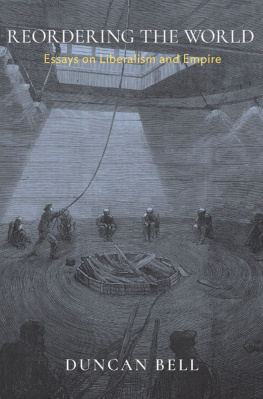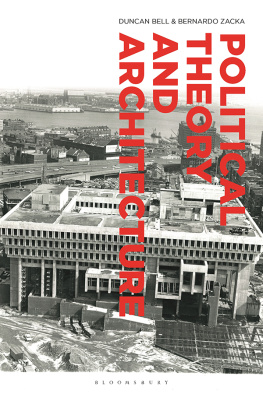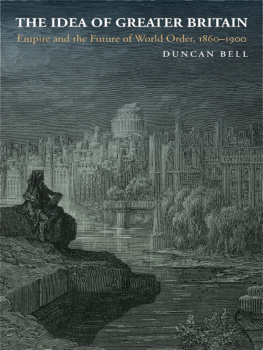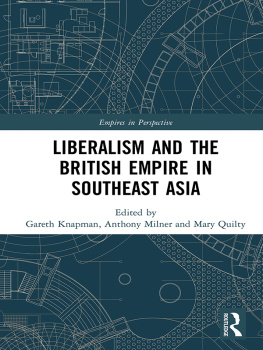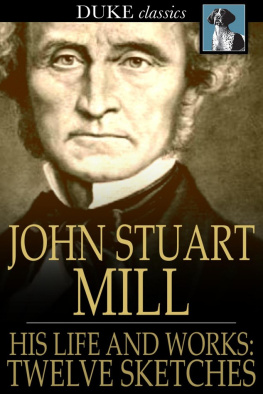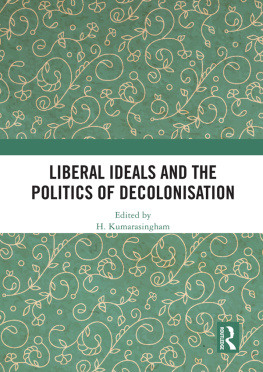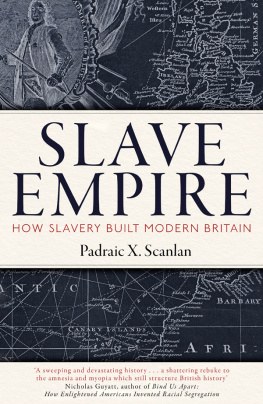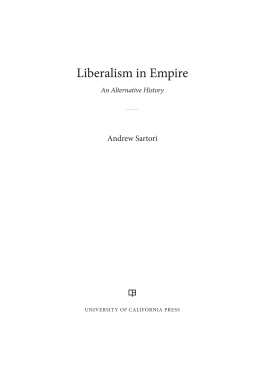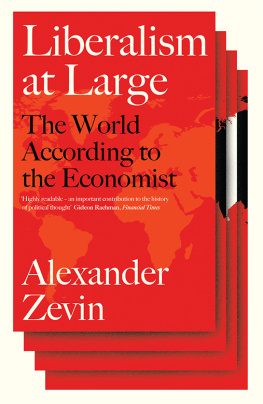
Reordering the World

Reordering the World
ESSAYS ON LIBERALISM AND EMPIRE

Duncan Bell
PRINCETON UNIVERSITY PRESS
Princeton and Oxford
Copyright 2016 by Princeton University Press
Published by Princeton University Press, 41 William Street,
Princeton, New Jersey 08540
In the United Kingdom: Princeton University Press, 6 Oxford Street,
Woodstock, Oxfordshire OX20 1TW
press.princeton.edu
Jacket art: Coiling the Atlantic Telegraph cable in one of the tanks on board the Great Eastern (engraving). Look and Learn / Illustrated Papers Collection / Bridgeman Images
All Rights Reserved
Library of Congress Cataloging-in-Publication Data
Bell, Duncan, 1976 author.
Reordering the world : essays on liberalism and empire / Duncan Bell.
pages cm
Includes bibliographical references and index.
9780691138787 (hardcover : alk. paper)
l. LiberalismGreat BritainHistory. 2. ImperialismHistory. 3. Great BritainColoniesHistory.
JC574.2.G(Great Britain)2015027893
British Library Cataloging-in-Publication Data is available
This book has been composed in Garamond Pro and Ideal Sans
Printed on acid-free paper.
Printed in the United States of America
1 3 5 7 9 10 8 6 4 2
FOR DOROTHY, WITH LOVE AND THANKS
CONTENTS

ACKNOWLEDGMENTS

T he essays collected in this volume were written over a period of more than a decade, and along the way I have accumulated numerous personal and intellectual debts. Id like to thank the following for their generous support and penetrating discussions about political theory and imperial history: David Armitage, Peter Cain, Michael Freeden, Ian Hall, Zaheer Kazmi, Karuna Mantena, Jeanne Morefield, Isaac Nakhimovsky, and Richard Tuck. In Cambridge, Joel Isaac, Duncan Kelly, and Peter Mandler are ideal interlocutors. The great Istvan Hont provided intellectual encouragement and friendship over many years. I miss him greatly. Casper Sylvest has commented incisively on just about everything Ive written, and for that act of supererogatory endurance, and much else besides, Im deeply grateful to him. Moreover, I thank him for allowing me to reprint our jointly authored essay as of this volume. The following all commented on one or more of the chapters: Robert Adcock, Jens Bartelson, Mark Bevir, Alex Bremner, Chris Brooke, David Cannadine, Greg Claeys, Linda Colley, David Craig, Mary Dietz, Saul Dubow, Daniel Deudney, Mark Goldie, John Gunnell, Ian Hunter, Ben Jackson, Charles Jones, Stuart Jones, Peter Katzenstein, Ira Katznelson, Daniel ONeill, Martti Koskenniemi, Ron Krebs, Chandran Kukuthas, Anthony Lang, Michael Ledger-Lomas, Joanna Lewis, Patchen Markell, Mark Mazower, Iain McDaniel, Jennifer Mitzen, Robert Nichols, Jon Parry, Nicholas Phillipson, Quentin Skinner, Katherine Smits, Tim Stanton, Gareth Stedman Jones, Anders Stephanson, Miles Taylor, Colin Tyler, Cheryl Welch, Brian Young, and Bernardo Zacka. Caroline Ashcroft and Eliza Garnsey did stellar work helping to prepare the manuscript. Kathleen Cioffi has been an exemplary production editor. Ben Tate has been a marvelously positive and sympathetic editor. Above all, Sarah Fine has been a constant source of inspiration, as have our daughters, Juliet and Alice. Thanks to one and all.
A number of institutions have provided essential practical and financial support. The Centre of International Studies, and now the Department of Politics and International Studies, both at the University of Cambridge, have been admirably collegial environments in which to pursue serious scholarly work at the intersection of political theory, history, and international relations. The same is true of Christs College, Cambridge. The Minda de Gunzburg Center for European Studies at Harvard hosted me for a productive period of sabbatical leave. The Leverhulme Trust has been a magnificent sponsor of the humanities and social sciences in the United Kingdom, and I have benefitted greatly from their largesse, first with the award of an Early Career Fellowship, and more recently, with a Philip Leverhulme Prize. These have given me invaluable time to conduct research for some of the chapters in this book.
Finally, I am grateful to the editors and publishers for permission to reprint the following material:
: Empire, in Historicism in the Victorian Human Sciences, ed. Mark Bevir (Cambridge: Cambridge University Press, forthcoming). Reprinted with permission
: Imagined Spaces: Nation, State, and Territory in the British Colonial Empire, 18601914, in The Primacy of Foreign Policy in British History, ed. William Mulligan and Brendan Simms (Basingstoke: Palgrave, 2010), reproduced with permission of Palgrave Macmillan
: The Project for a New Anglo Century: Race, Space, and Global Order, in Anglo-America and Its Discontents: Civilizational Politics Beyond East and West, ed. Peter Katzenstein (London: Routledge, 2012)
: International Society and Victorian Political Thought: Herbert Spencer, T. H. Green, and Henry Sidgwick, with Casper Sylvest, Modern Intellectual History, 3/2 (2006) Cambridge University Press. Reprinted with permission
: Republican Imperialism: J. A. Froude and the Virtue of Empire, History of Political Thought, 30/1 (2009), reproduced courtesy of Imprint Academic
: Democracy and Empire: Hobson, Hobhouse, and the Crisis of Liberalism, in British International Thought from Hobbes to Namier, ed. Ian Hall and Lisa Hill (Basingstoke: Palgrave, 2009), reproduced with permission of Palgrave Macmillan
This book is dedicated to my wonderful mother, Dorothy.
Reordering the World

CHAPTER 1
Introduction

Reordering the World
[C]entral to the lives of all empires have been the ways in which they have been constituted through language and their own self-representations: the discourses that have arisen to describe, defend, and criticize them, and the historical narratives that have been invoked to make sense of them.
JENNIFER PITTS
F rom the earliest articulations of political thinking in the European tradition to its most recent iterations, the nature, justification, and criticism of foreign conquest and rule has been a staple theme of debate. Empires, after all, have been among the most common and the most durable political formations in world history. However, it was only during the long nineteenth century that the European empire-states developed sufficient technological superiority over the peoples of Africa, the Americas, and Asia to make occupation and governance on a planetary scale seem both feasible and desirable, even if the reality usually fell far short of the fantasy. As Jrgen Osterhammel reminds us, the nineteenth century was much more an age of empire than an age of nations and nation-states. The largest of those empires was governed from London.
Even the most abstract works of political theory, Quentin Skinner argues, are never above the battle; they are always part of the battle itself.The ideological conflict I chart in the following pages was one fought over the bitterly contested terrain of empire. The main, though not the only, combatants I survey are British liberal political thinkersphilosophers, historians, politicians, imperial administrators, political economists, journalists, even an occasional novelist or poet. Multifaceted and constantly mutating, liberalism was chiefly a product of the revolutionary ferment of the late eighteenth century, of the complex dialectic between existing patterns of thought and the new egalitarian and democratic visions pulsating through the Euro-Atlantic world. A squabbling family of philosophical doctrines, a popular creed, a resonant moral ideal, the creature of a party machine, a comprehensive economic system, a form of life: liberalism was all of these and more. Intellectuals were central to the propagation and renewal of this expansive ideology, though they were far from the only agents involved. From Bentham to Hobson, from Macaulay to Mill, from Spencer to Sidgwick, a long parade of thinkers helped sculpt the contours of the evolving tradition, elaborating influential accounts of individual freedom, moral psychology, social justice, economic theory, and constitutional design. Liberal thinkers wrote extensively about the pathologies and potentialities of empire, developing both ingenious defenses and biting critiques of assorted imperial projects. The conjunction of a vibrant intellectual culture and a massive and expanding imperial system makes nineteenth-century Britain a vital site for exploring the connections between political thought and empire in general, and liberal visions of empire in particular. The vast expanses of the British empire provided both a practical laboratory and a space of desire for liberal attempts to reorder the world.
Next page
